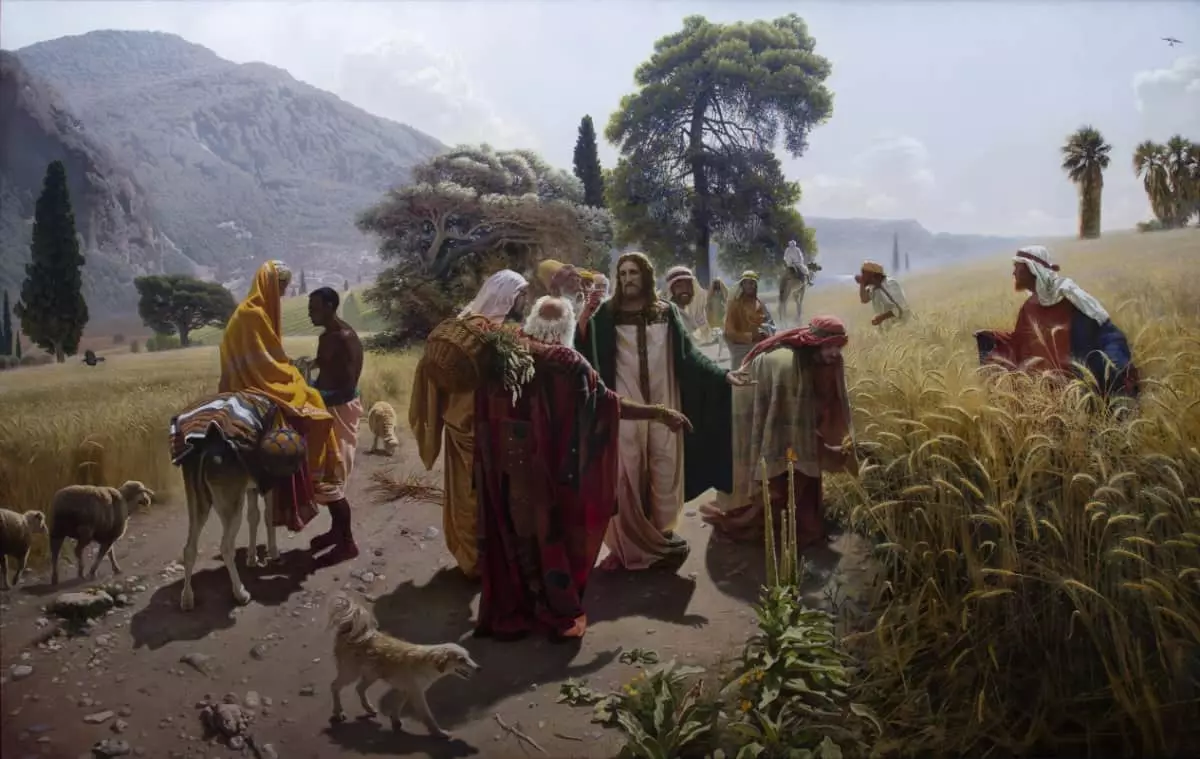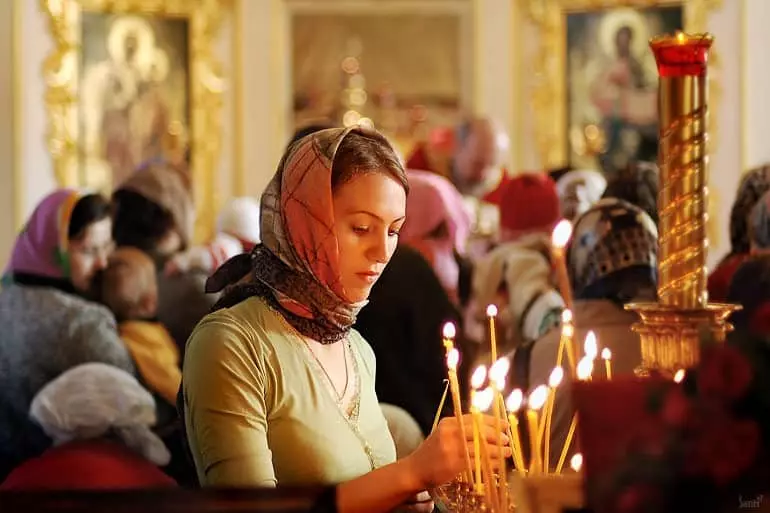Why can not work in church holidays? And which specifically actions are under the ban, as they can pull the trouble to the violator? If you still do not know the answer to these questions, then I propose to find them in today's material.
What does the Bible tell us?
In the fourth command in the Old Testament, it is designated that the believer should work for 6 days a week, and in the last, seventh day - to relax from labor. This covenant received Moses from the Lord, when I communicated with him on the sacred mountain of Sinai.

Find out what awaits you today - a horoscope for today for all zodiac signs
God taught the Prophet that each of us should constantly work, getting joy from the result of its activities. But the seventh day should be given to itself a body and soul rest, focus on the spiritual, reflect on God and to pray hard.
What is due to this rule? According to the same Bible, the Creator, created our world for 6 days, worked hard not to twist the hands, and on the seventh day he rested against labor. The man is creative by God, he must take an example from the creator: to work like him, and also rest.
At the same time, it is important to engage in only the work that has a creative nature, and not be destruction. After all, we are all children of the creator.
If you are from nature lazy, afraid or do not like to work, then think about what: the whole world around us exists exclusively thanks to the non-stopping cycle of various cases. And showing a fever, man is likened to a worst plant, which will soon die.
By numerous requests of readers, we have prepared an application "Orthodox calendar" for a smartphone. Every morning you will receive information about the current day: Holidays, posts, commemoration days, prayers, parables.
Download free: Orthodox calendar 2020 (Available on Android)
Our body is also working, and 24 hours a day. The heart never ceases to beat and pump blood, the lungs fill the body with oxygen, and other organs work. Therefore, it is important not to be afraid of labor, to be able to work effectively, necessarily making work in joy to yourself, and not just for the sake of getting income. After all, any activity that does not bring pleasure, sooner or later lead to the collapse.
But not to forget and comply with the biblical prescription of the need to refrain from work every seventh day of the week, and on holidays. What exactly - learn next.
In which Orthodox holidays can not work
In the church calendar, all holidays are divided into two categories:
- Two-month holidays.
- Great holidays.
Let's start with the first category. There are 12 two-month holidays and they are of particular importance for believers. For these days, Christians recall the meaningful events from the life of Jesus Christ and the Virgin Mary.
Mostly, the two-month church holidays fall into fixed dates, then they are called non-transmitting. But part of the holidays of the holidays changes annually, being depending on the occurrence of Easter.
The two-month holidays are divided into the Virgin and Lord. The Lord for Orthodox are greater importance. With their falling on Sunday, the traditional service in the church is replaced by a festive liturgy. But when a Virgin celebration comes on Sunday Day, Sunday ministry unite with the festive, but the first service is considered more important.
Let's now consider all the two-month holidays in Orthodoxy:
- Christmas is christmas - celebrated on January 7 in memory of the emergence of the Savior.
- The Baptism of the Lord (otherwise the Epiphany) is celebrated on January 19, on this day Jesus Christ was sacrificed by John the Baptist in the waters of the Jordan River.
- Personia of the Lord - falls on February 15. This is 40 days from the date of Christmas, then Maria with Joseph for the first time brought the baby Jesus to the temple of the Lord.
- Annunciation - Celebrated on April 7 In memory of the benefit of the Holy Virgin, the good news from his pregnancy, which the Angel Gabriel brought.
- Palm Sunday - falls on the last Sunday day before Easter. This day remembers the solemn visit to the Savior of Jerusalem. Holiday symbol - palm and verbal twigs.
- Ascension of the Lord - accounts for 40 days after Easter. The memory of the Savior's Esity on the sky.
- Holy Trinity - falls 50 days after Easter. Memory about the descent of the Holy Spirit on the followers of Christ.
- Transformation Lord - holiday date on August 19th. In the day, the holy apostles prayed on the mountain see the greatness and glory of Christ.
- Assumption of the Blessed Virgin Mary - Date August 28. In the given day buried Mother God. All followers of Christ gathered on her funeral.
- Christmas Blessed Virgin Mary - falls on September 21.
- Exaltation of the Cross of the Lord - the date of the holiday on September 27. It is noted in memory of the foundation of the cross, on which Jesus Christ was crucified.
- Introduction to the temple of the Blessed Virgin Mary - falls on December 4th. It is celebrated in memory of the dedication of the Little Maria to the Lord, when parents gave it to raising high priests.

Now let's talk about great holidays. They are in the church calendar there are 6.
- Cutting the Lord - falls on January 14th. On this day, recall the crucification of the infant Jesus for the Jews for the Jews on the eighth day after appearing on the light.
- St. Vasily's Great Day - also celebrated on January 14th. In this holiday, the memory of the Great Writer, the theologian Vasily, who amounted to a large number of prayers, church ministries, invented the iconostasis.
- Christmas of John the Baptist - Celebrated July 7th. The infant John the Baptist appeared on this date (otherwise it is called the Forerunner), who in the future fell out the honor of the baptism of the Savior himself.
- Petrov Day - It is celebrated on July 12 in memory of the two followers of Jesus Christ - the Apostle Peter and Paul, who as martyrs died for the Christian faith.
- Condition of the head of John the Forerunner - celebrated on September 11 in memory of the death of John the Baptist, who was beheaded by order of the Galilee ruler Herod.
- Pokrov to the Most Holy Theotokos - falls on October 14th. In this day, the Mother of God descended from heaven and covered believers with their ooform (bedspread) throughout the service.
And if we consider old-handed calendars, then this list adds another 2 days in memory of the Holy People:
- The holiday of John the Theologian - falling on May 8 and on September 26.
- Memory Day Sergius Radonezhsky - coming on September 25.
There were no Easter holiday in these lists, but only because it stands separately and is the main Christian holiday, on which Christianity was founded. Naturally, working in a bright Sunday of Christ is also impossible.
The holidays listed above are that special days in the Orthodox calendar, which is worth refraining from performance. There are also dates of the memory of holy personalities. And every Sunday day is also considered a holiday when it is necessary to go to the church to the service, to pray hard, to engage in its spiritual life.
Is it possible to work in church holidays?
This question has an ambiguous answer: it all depends on the circumstances. For example, if a person on duty is forced to work on a festive day (for example, he is a doctor or military, or fireman), then such activities are not considered for sinful occupation. In addition, it is possible to think about the Lord not only in the temple, but also from home or any other place.
However, if you do not have an acute need for you, but you consciously make a decision to make dirty work on a holiday, this is considered to be a sin.

What actions are prohibited on holidays
Even since the time of Kievan Rus, after the approval of Christianity, a ban on the performance of homework on the days of Orthodox holidays has appeared. For its observance, the state authorities carefully followed. Markets, baths, people motivated for holidays for holidays to visit the temple.And although since then has changed a lot, actions that cannot be performed in religious holidays remain unchanged:
- Cannot be harvested in the house. You need to clean up before the holiday so that the dwelling is clean and cozy.
- It is impossible to wash. Although in this case the prohibition is ambiguous: after all, if earlier the process of washing clothes occupied almost all day from a woman, today at pressing the button on the washing machine goes a couple of seconds. But if it is not urgent, it is better to refrain.
- It is impossible to women to do needlework: sewing, embroidery, knitting. And most of all, this ban refers to women in position, since the old sign says that they can "sew" mouth or eyes by the future kid.
- It is unacceptable to squander, condemn other people, to do evil and sin to any other way - this item is not even discussed.
- Do not abuse with alcohol and food pleasures. After all, any holiday is designed to remind a person about the need for spiritual development, about God.
Fees related to holidays
There is a list of admission concerning Christian holidays.
- On Paraskeva Friday (November 10) - you can not do needlework, but the woman should boast of its products before, last year. After all, Paraskeva Friday is considered a patronage of needlework.
- On the day of St. Ilya (August 2) - under the ban hits bathing in natural reservoir. It is believed that it is a danger.
- On the day of Vasily (January 14) - you need the first to go in the dwelling, then the house will be lucky.
- On the day of memory of the death of John the Baptist (September 11) - it is forbidden to cut round fruits and berries (such as watermelons, pumpkins), because the saint was beheaded.
- But on the day of the Holy Trinity, on the contrary, it is recommended to plant radish - it is believed that then the gardeners will receive a generous harvest. And still on the trinity of the hostess baked pies.
- In the spirits of the day (the next day after the Trinity), they are traditionally sent to the search for grass, which believes acquire healing properties.
You can summarize that the prohibitions associated with the performance of work on holidays are not too strict. Basically, they relate to the obsolete lifeguard, when such or other activities required much more and effort. Therefore, if you have an urgent need to make some domestic task on a holiday - do it, but so that it does not go to the detriment of the spiritual aspect of life.
